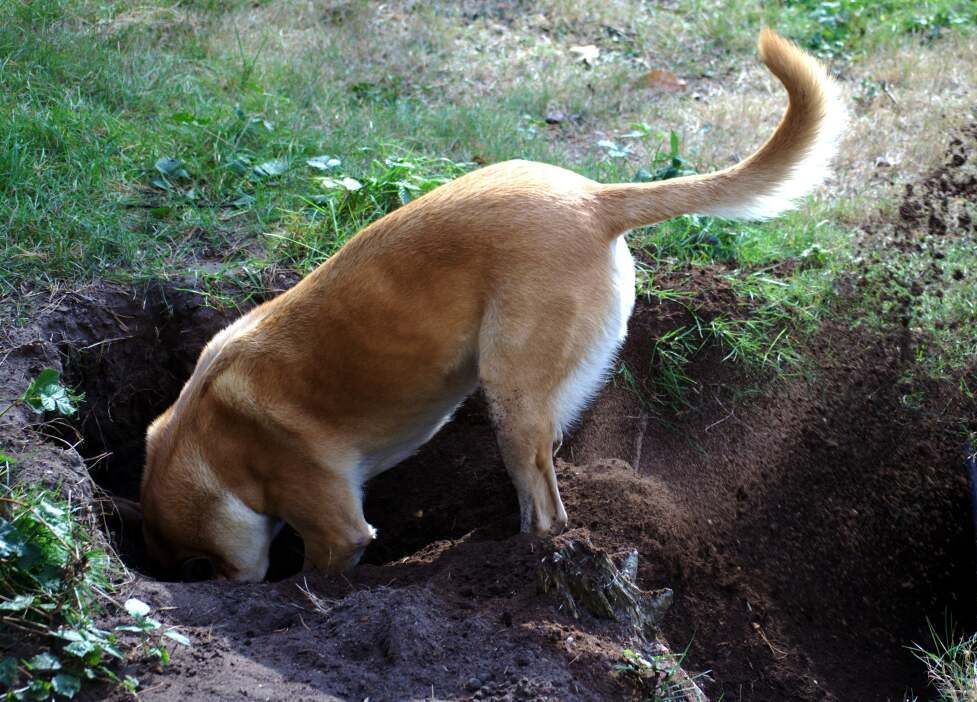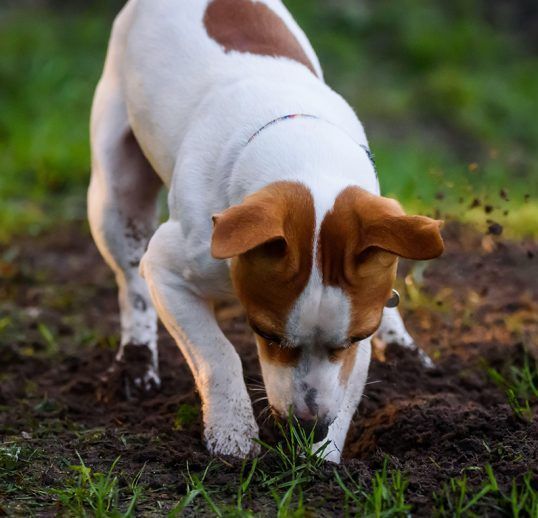A Dog Behaviorists Guide To a Hole-Digging K9
Reasons Your Dog Might Be Digging
If you are a homeowner, you might have a yard with simple plants or even a large garden. Regardless of the size of the yard or how much work you have put into maintaining the beauty of your lawn, your dog may one day greet you with muddy paws and the biggest grin on their face. A common reaction for many dog owners is to display shock by the disaster that has become your yard or garden. Regardless if your dog is the type to dig lots of little hotels or one giant hole, all dogs instinctively dig at some point in their life.
Some dogs dig deep into the ground to hunt, searching for small animals like moles or groundhogs. When your dog finds a small creature in a hole, they will most likely dig endlessly until they catch their prey. Some dogs, however, like to entertain themselves by playfully digging holes around the yard randomly. Some dogs dig holes in order to store their things. Your dog may be burying food, bones, toys or treats by digging a hole, moving their treasure from one hole to another. On warm days, a dog might dig a hole to lay on in order to cool themselves down or even to keep warm from the cold. These holes are typically dug in either cool or warm areas depending on the dog’s needs. If you are finding that your dog is leaving craters all over your yard, it’s important to know that your dog isn’t doing it out of spite or a desire to destroy your landscaping. It is more likely that your dog is seeking entertainment, attention, comfort, escape, prey, or protection. Thankfully, you don’t have to give in to your dog’s habits, but instead learn solutions to give you peace of mind when it comes to tackling these often annoying and sometimes destructive behaviors.
Speak With A Dog
Training Expert
Speak With A Dog Training Expert
Thank you for contacting us!
We will contact you shortly!
Please try again later.
Obedience Training Meets Adaptation
All dogs have one thing in common: the societal pressure to be a “good dog.” Adopting and raising a handicapped dog is a wonderful humane act. However, whatever limitations your dog may face does not make them immune to societal expectations. Thankfully, obedience training is an enriching activity that can be achieved by any dog, regardless of their limitations, and is the first step toward helping your dog adjust to living in a high pressure world.
The first step for a dog obedience trainer is to identify your dog’s limitations. Understanding what caused your dog's disability will give the trainer insight into how your dog needs to be communicated with, helps the trainer set reasonable expectations, and also helps your dog’s trainer avoid any pain points on your furry family member. Similar to human beings, disabilities in dogs can
Speak With A Dog
Training Expert
Speak With A Dog Training Expert
Thank you for contacting us!
We will contact you shortly!
Please try again later.
arise due to various reasons. Some dogs are born with disabilities, while others may become handicapped due to congenital or contracted diseases or injury. It is quite common for a dog to experience blindness, deafness, or experience mobility challenges that can require training modifications. An expert dog obedience trainer will be able to create a training program for your dog that will help your dog to avoid painful movement and have fun while learning new skills. Your dog’s trainer will also be able to take advantage of your dog’s heightened senses to help make adaptive learning possible. Focusing on your dog’s available senses will help you as the owner understand your dog’s strengths and weaknesses and rethink the way your dog needs to be communicated with. With all of this in mind, the obedience trainer will be able to put together an adaptive learning plan to suit your dog and its unique needs.


Preparing Your Home For A Disabled Dog
First and foremost, it is important to remind any dog owner or future dog owner that owning any pet is a lifetime commitment. It is crucial that your dog is fully integrated into your everyday life and that it knows you are dedicated to ongoing care for it. Time is an aspect of dedication towards your dog. Adopting or owning a disabled dog requires time invested into researching and understanding your dog's limitations. Time is also required for dedicated training and working with your disabled dog. A lot of patience and attention to training is needed compared to a fully able dog, and alternative training techniques created by a professional trainer can be time consuming.
The financial responsibility of caring for a disabled dog is another factor to consider when making this life long commitment. While some disabilities do not require medical intervention, others may require ongoing treatment or medical expenses is the disability has the potential to worsen as the
How To Prevent Your Dog From Digging
You may not ever stop your dog’s desire to dig, but that doesn’t mean you have to constantly struggle with your dog making potholes in your yard. If your dog is hunting prey, it is recommended to use safe and humane methods to exclude the burrowing animals from the yard or making your yard or garden unattractive to them. Do not use any product or method that could be toxic or dangerous to your pets or other animals. If your dog is digging for entertainment, expand your dog’s world and increase their people time. Some practical ways to do this include walking your dog at least twice daily; lack of exercise is a leading cause of behavioral problems. Play with your dog using active toys like balls or flying discs, and keep your dog interested with busy toys around the yard such as kong-type toys filled with treats. Comfort and protection from hot weather, the cold, or rain is another common reason for a dog digging. Provide your dog with the comfort or protection they seek. Bring them inside more often and make sure their outdoor shelter is comfortable and protected against extreme temperatures.
Remember, any behavior your dog displays can become attention-getting behavior if your dog learns that they receive attention for engaging in it. Ignore attention-seeking behavior and give your dog lots of praise for “good dog” behavior. Make sure your dog has enough walk and play time with you on a daily basis. If your dog is a dedicated “digger”, set aside an area of the yard where it’s ok for them to dig and teach them where that digging zone is. Make the digging zone attractive by burying safe items like toys for them to discover. Reward your dog with praise when you see them digging in the digging zone. If you do catch your dog digging in an unacceptable area, interrupt the behavior with a loud noise and firmly say, “No Dig!” Then immediately lead your dog to the digging zone. Make the unacceptable digging spots temporarily unattractive by placing rocks or chicken wire over them.
If you’ve found that you have exhausted all of these strategies and still can’t seem to solve your dog’s digging problem, keep them indoors with you and supervise their outside time. Despite how frustrating this behavior can be, there is always a healthy, long-term solution. Consider consulting a dog behaviorist to give your dog 1:1 behavior training to break the streak of habitual digging.
dog ages. Tools are another financial investment needed to help a dog’s limitations adapt to its environment. For example, a head collar or halter may be needed to help a blind dog navigate new spaces by preventing it from bumping into barriers. If your dog has a mobility handicap, a dog cart or lifting harness can be used to help your dog move around without much pain. Private obedience training classes are also another crucial investment for helping you and your dog adapt to its lifestyle in its home and social environments. An obedience trainer will help you teach your handicapped dog how to associate obedience with good things through positive reinforcement. The trainer will also help you learn how to be observant to your dog's signals and cues for communicating its needs. The obedience trainer will also help to nurture a great relationship between you and your handicapped dog by prioritizing simple obedience instructions for you and your dog to learn together.
Dogs are remarkable creatures. Owning a dog with a handicap can help you learn new ways to look at and adapt to the world around you. While a dog’s disabilities can make obedience training more challenging, Enrolling your disabled dog into an obedience training program will expand their ability to live a full and rewarding life.
